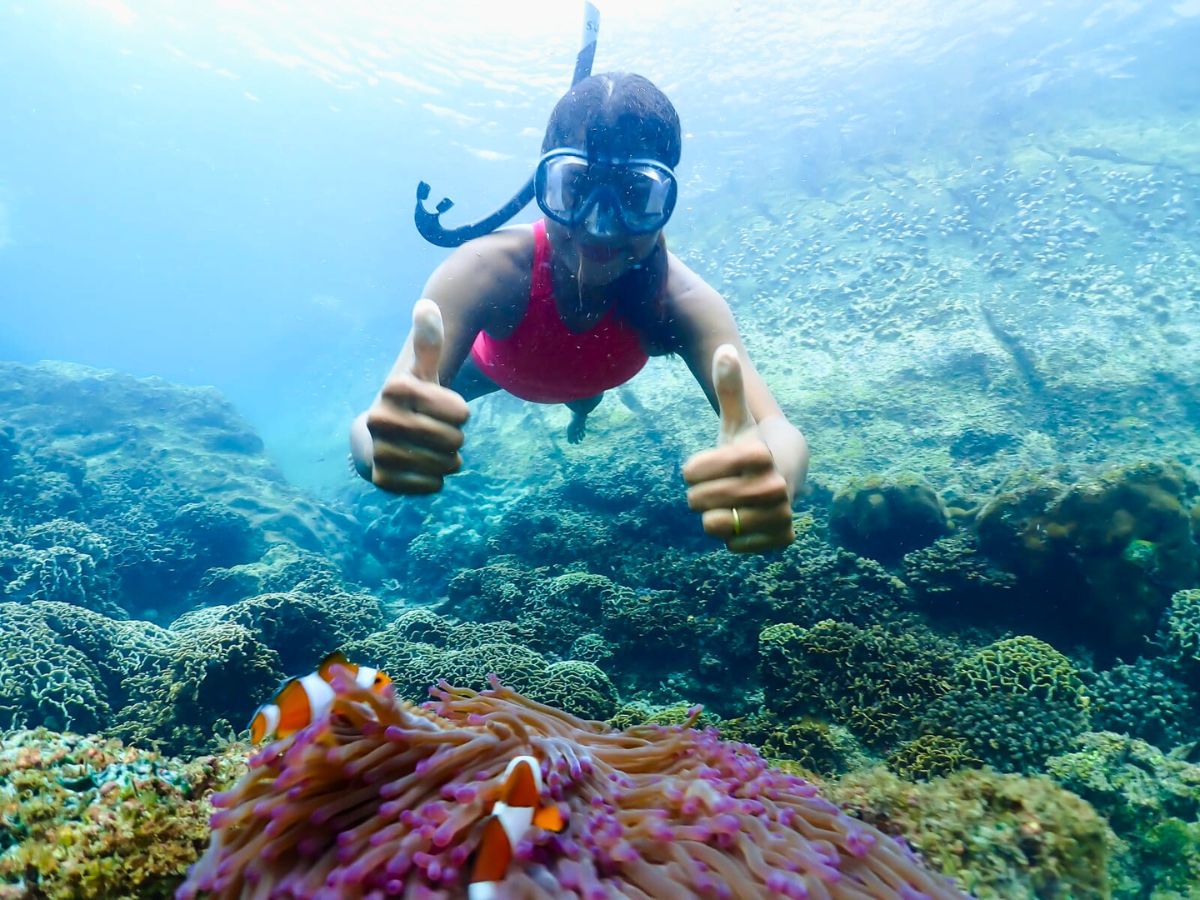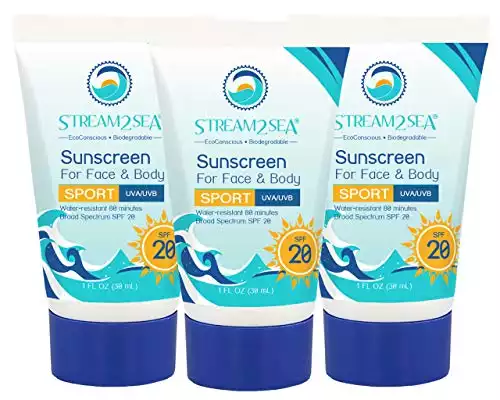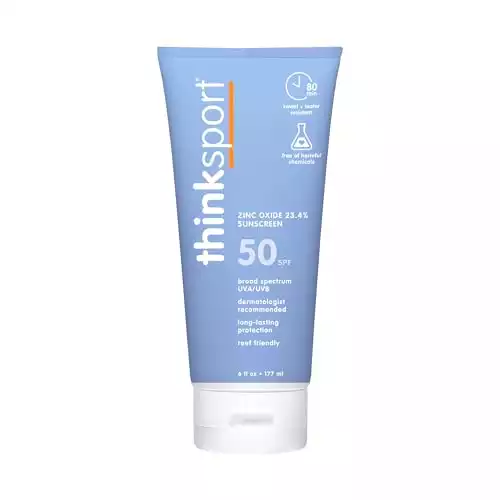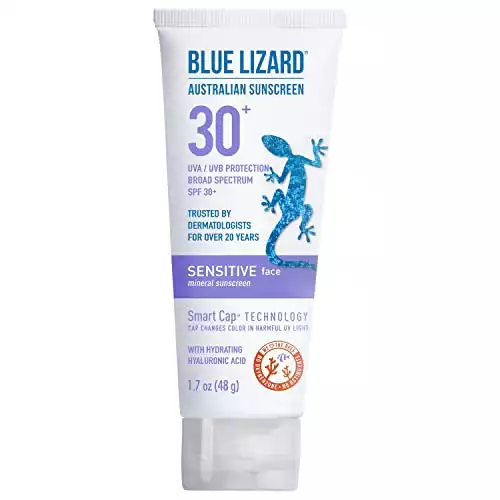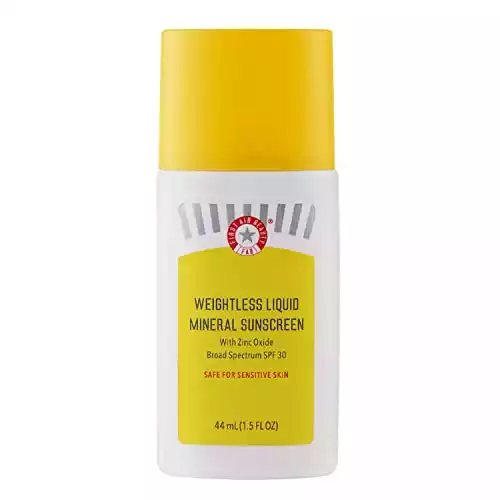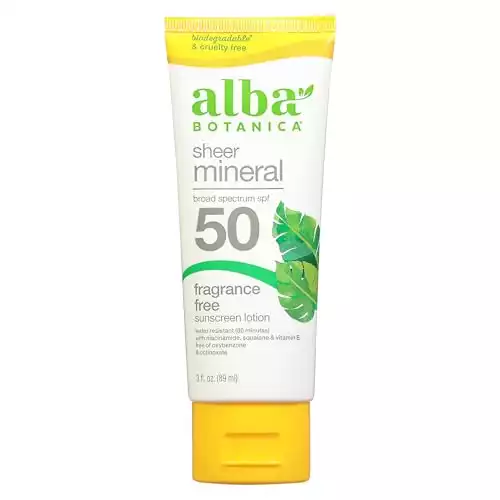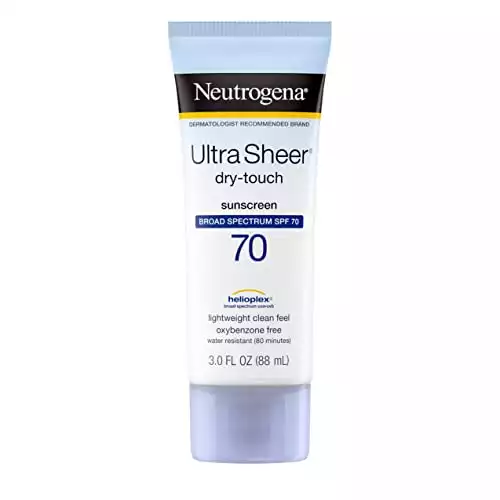In this Article
Toggle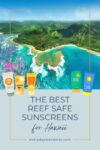
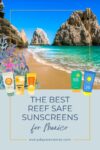
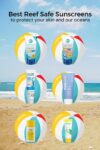
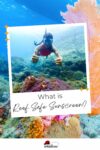
Who knew that saving the ocean could be as simple as slathering on the right sunscreen? It’s true! Before you take your next beach vacation, read this to select a reef safe sunscreen to protect both your skin and the beautiful marine life.
The first time I visited Hawaii, I was obsessed with chasing a gorgeous tropical tan. I thought spending every daylight hour outdoors with minimal sun protection would give me the same golden-brown complexion everyone else seemed to have. Instead, my ridiculously fair skin was horribly sunburned after my first day on the island. A few years later, when I was still in my 30s, I dealt with my first episode of skin cancer. (And, for those counting at home, there have been three more in the two decades that have followed.)
I’m older and wiser now. I accept that my fair skin tone doesn’t tan and that sunscreen is the best way to prevent any more time under my dermatologist’s scalpel. But, my recent trip to Hawaii required me to learn about reef-safe sunscreen. It turns out that many of the ingredients in traditional sunscreens are harmful to coral reefs and marine life.
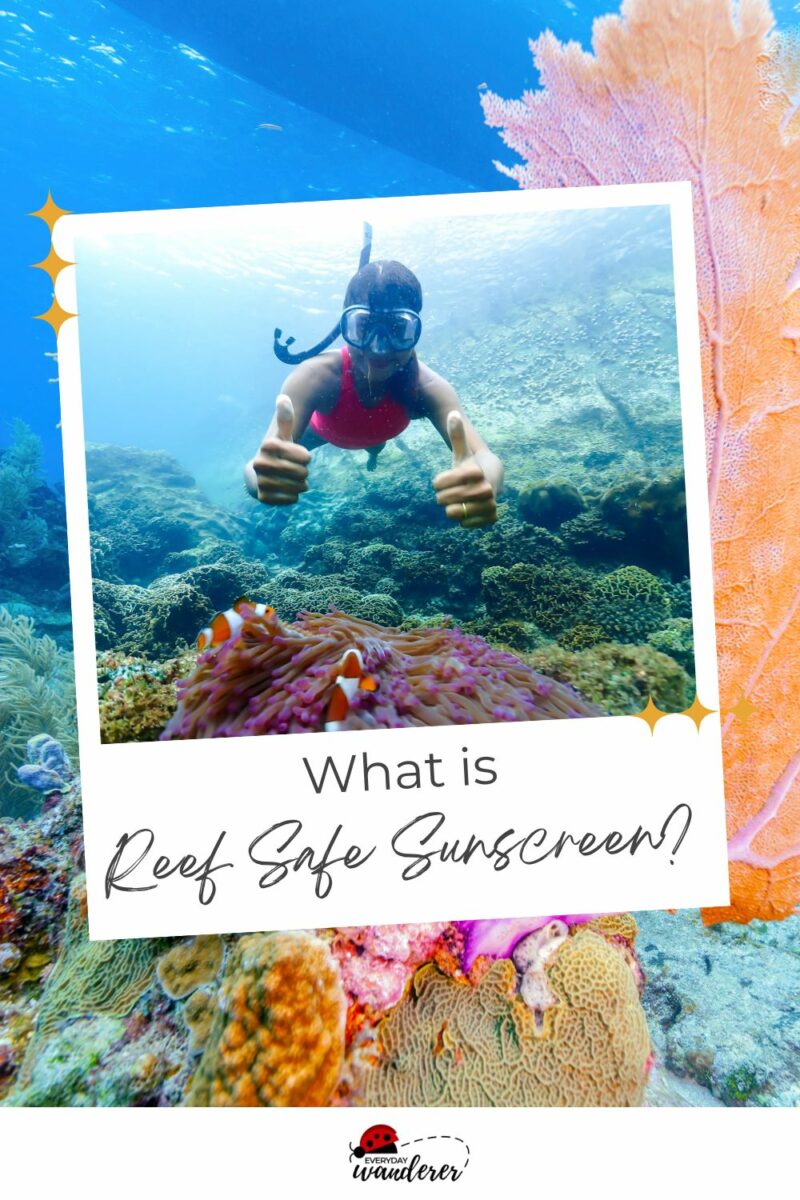
To help offset the costs of running EverydayWanderer.com, you’ll find affiliate links lightly sprinkled throughout the site. If you choose to make a purchase via one of these links, there’s no additional cost to you, but I’ll earn a teeny tiny commission. You can read all of the legal blah blah blah (as my little niece says) on the full disclosure page.
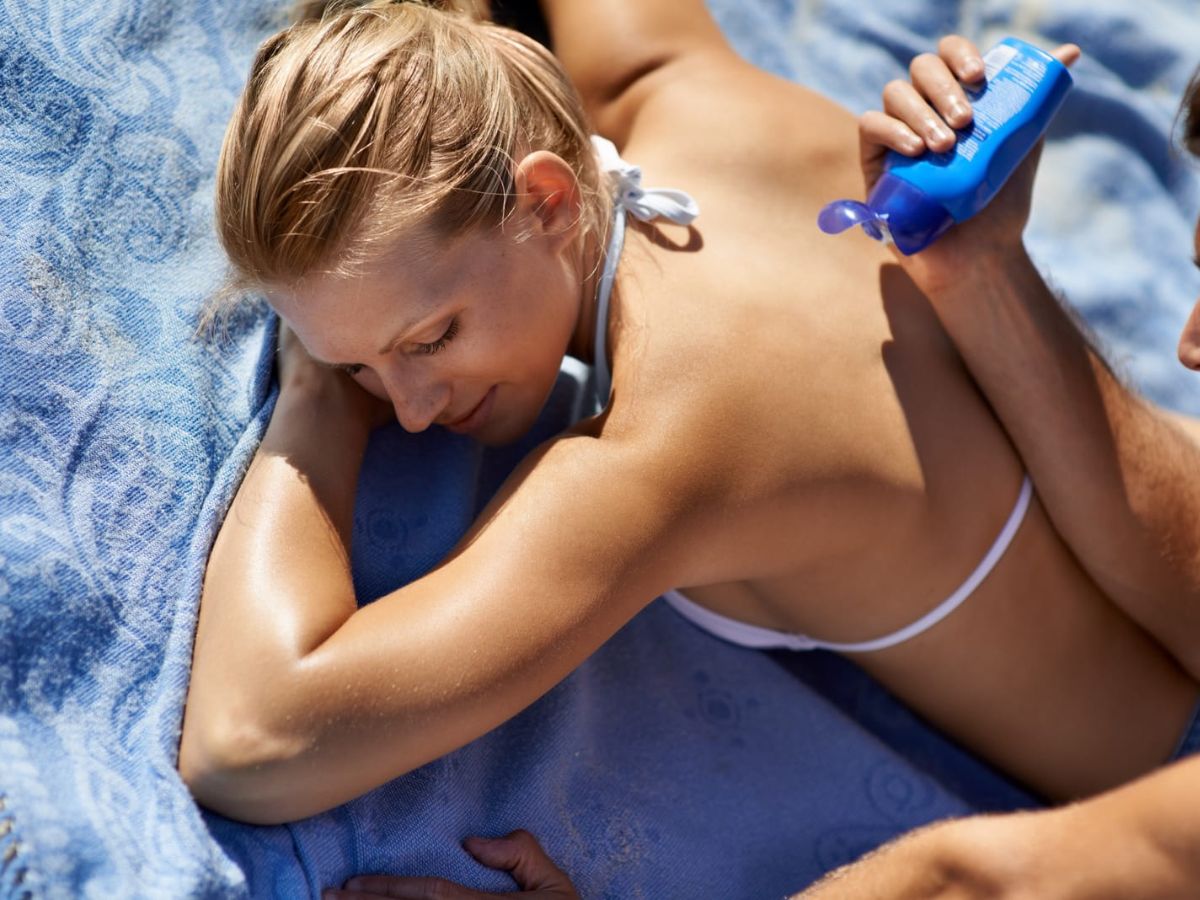
What is Reef Safe Sunscreen?
When applying sunscreen to your skin, you expect the sunblock ingredients to protect your skin from the sun. What you may not realize is that the ingredients in most sun-protection brands create a so-called chemical barrier to work. And while they work well for us, they can harm aquatic wildlife.
Sunscreen brands labeled as reef safe don’t rely on chemicals to block out the sun. Instead, they focus on mineral-based ingredients, like some cruelty-free makeup brands. Mineral-based sunscreen creates a physical barrier on your skin to protect it from the sun without any of those harmful chemicals.
Think about the white stripe you might see on a lifeguard’s nose. That’s zinc oxide, a mineral-based sunscreen. According to Michigan State University, it’s an excellent physical sunscreen and one you should look for when buying sunblock.
Back to chemicals in sunscreen — the journal Science reported that one of those chemicals, called oxybenzone, is toxic to coral and sea anemones. And if chemical sunscreens can harm aquatic life, what damage might they cause you and me?
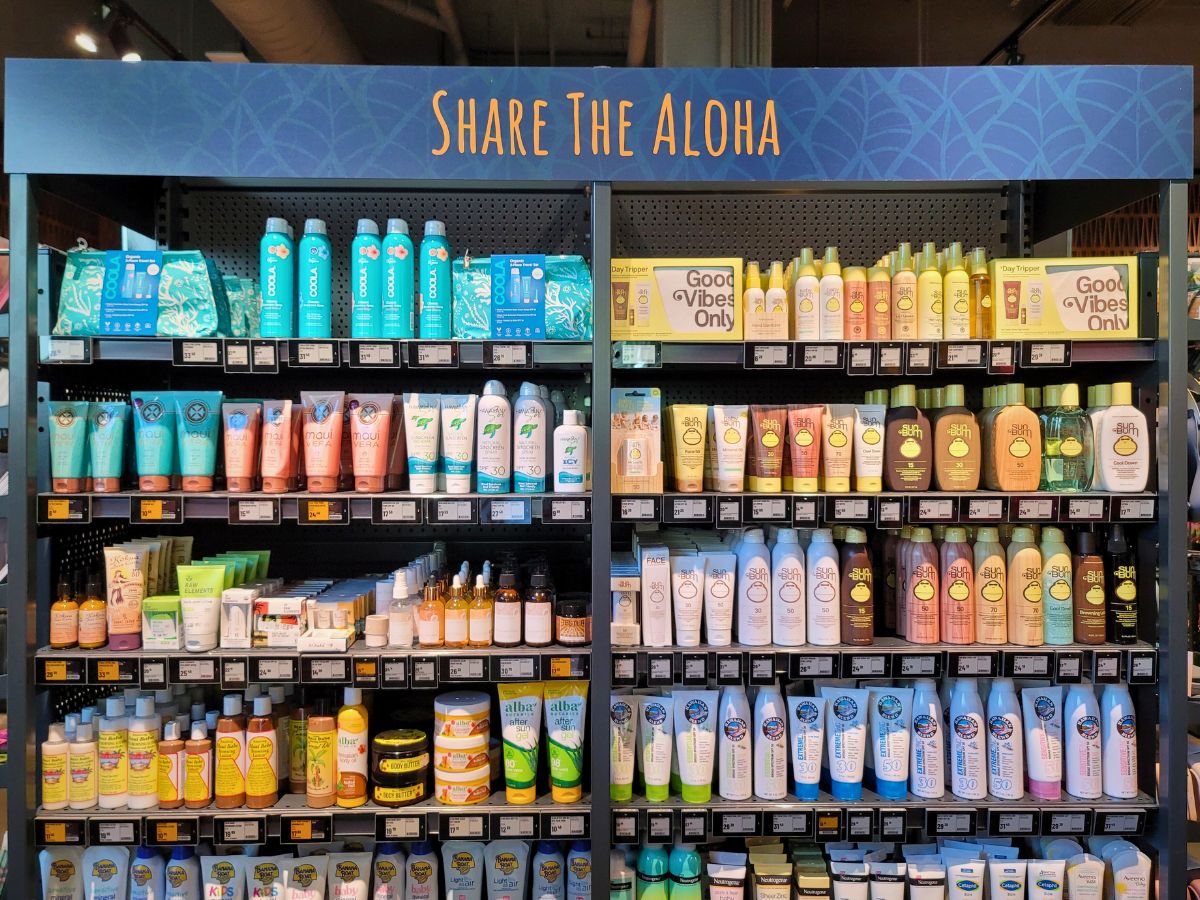
Tropical Destinations with Sun Protection Product Rules
In some locations, selling sun protection products that can harm marine life is against the law. That’s not to say that you will be fined for bringing them with you, but local stores can’t sell these products. So, if you forget your regular sunscreen at home, you’ll only be able to buy certain brands of mineral sunscreen.
These island nations and other tropical destinations currently ask visitors to only bring reef safe sunscreen and ban the sale of it:
- Aruba
- Bonaire
- Hawaii
- Key West, Florida
- Palau
- Riviera Maya in Mexico, including Cancun, Playa del Carmen, and Cozumel
- Turks and Caicos
- US Virgin Islands
Therefore, if swimming, snorkeling, or other water sports are on your list of things to do in one of these beautiful, tropical locations, make sure you pack a reef safe sunscreen brand.
Chemicals to Avoid in Your Sunscreen
According to the Coral Reef Alliance, Save the Reef, below is a list of sunscreen ingredients you want to avoid. These are the ones that can hurt marine life. The list starts with two chemicals beginning with the letter O.
They are:
- Oxybenzone
- Octinoxate
Other sunscreen chemicals to skip:
- Avobenzone
- Benzophenone-1
- Benzophenone-8
- Benzylparaben
- Butylparaben
- Ethylparaben
- Homosalate
- Methylparaben
- Octisalate
- Octocrylene
- OD-PABA
- 4-methylbenzylidene camphor
- Para-aminobenzoic acid (PABA)
- Parabens
- Propylparaben
- Triclosan
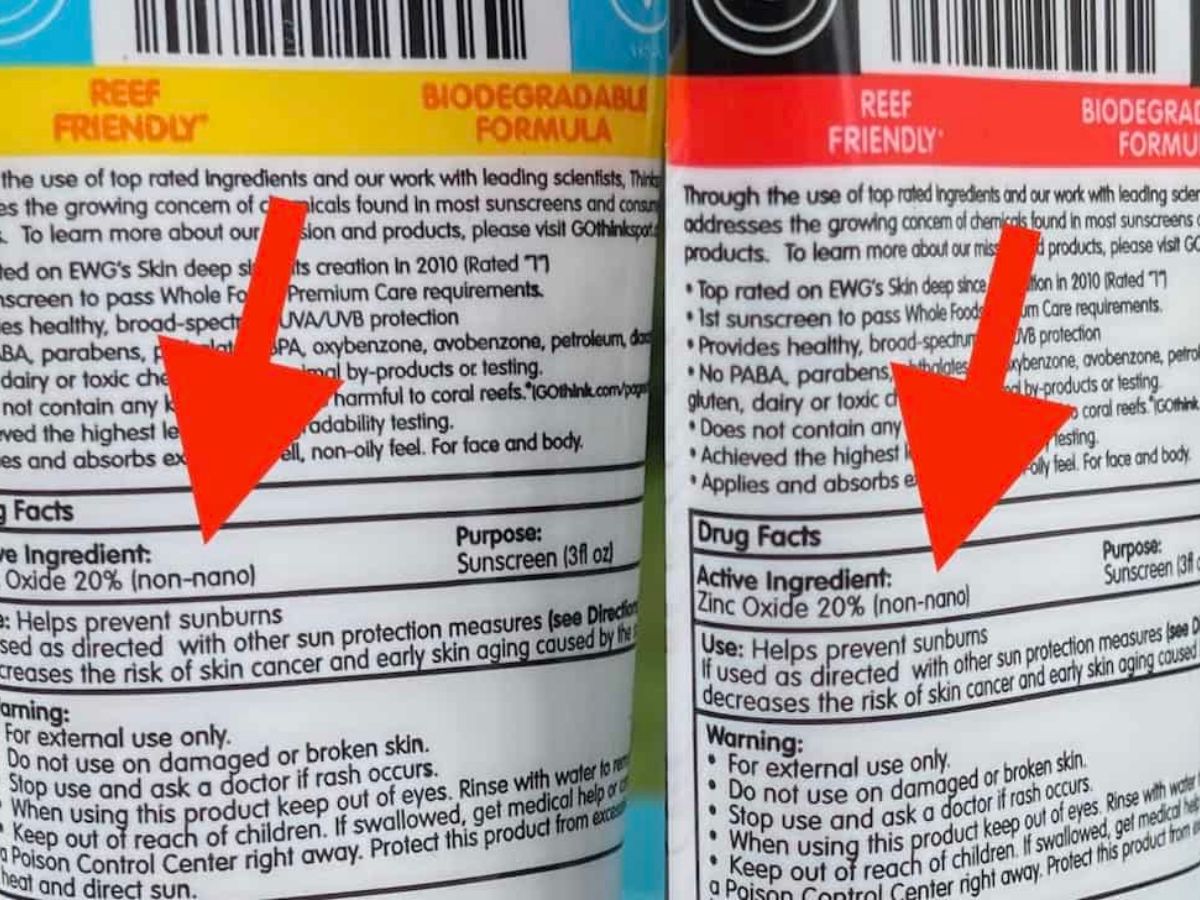
Just Say No to Nanoparticles
In addition to the above ingredients, you also want to avoid nanoparticles. What are nanoparticles? They’re particles in a mineral-based sunscreen that ensure that the product rubs into your skin and doesn’t leave a white film. Sounds great, right?
Wrong. While nanoparticles are small enough that your skin easily absorbs them, marine and aquatic life can absorb them, too, and they can harm sea life. Ideally, you want to choose products that say “non-nano.” You’ll usually find this information listed next to the active ingredients like this: (non-nano).
Finally, you may be aware of sunscreens with titanium dioxide and zinc oxide or just titanium dioxide in them. Unfortunately, titanium dioxide includes nanoparticles, so stick with non-nano zinc oxide instead.
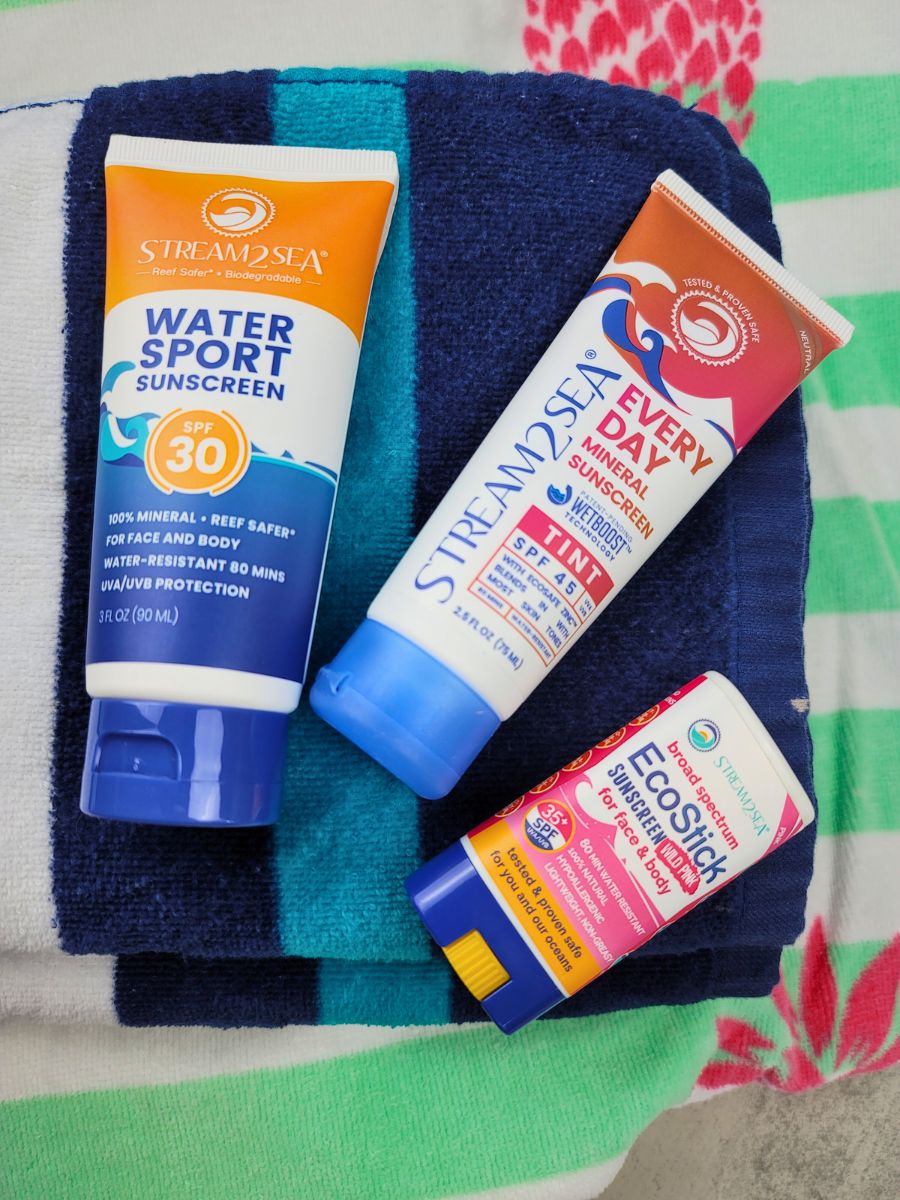
How to Tell If Sunscreen is Reef Safe
Unfortunately, the term “reef friendly” is not regulated, so don’t just select products with “reef friendly” printed on the label. Instead, check the “active ingredients” label on the back of your sunscreen or personal care product to ensure that reef-harming chemicals are not included.
You’ll want to look for mineral-based sunscreens with zinc oxide or titanium dioxide listed as active ingredients. Be sure they’re “non-nano” or “micro-sized” to avoid harmful nanoparticles. Skip sprays and mists, and choose lotions that are free of oxybenzone, octinoxate, octocrylene, and other ingredients on the bulleted list above. Opt for recyclable, reusable, or plant-based packaging to minimize plastic waste. By following these steps, you can enjoy the sun while protecting our delicate reefs and your health.
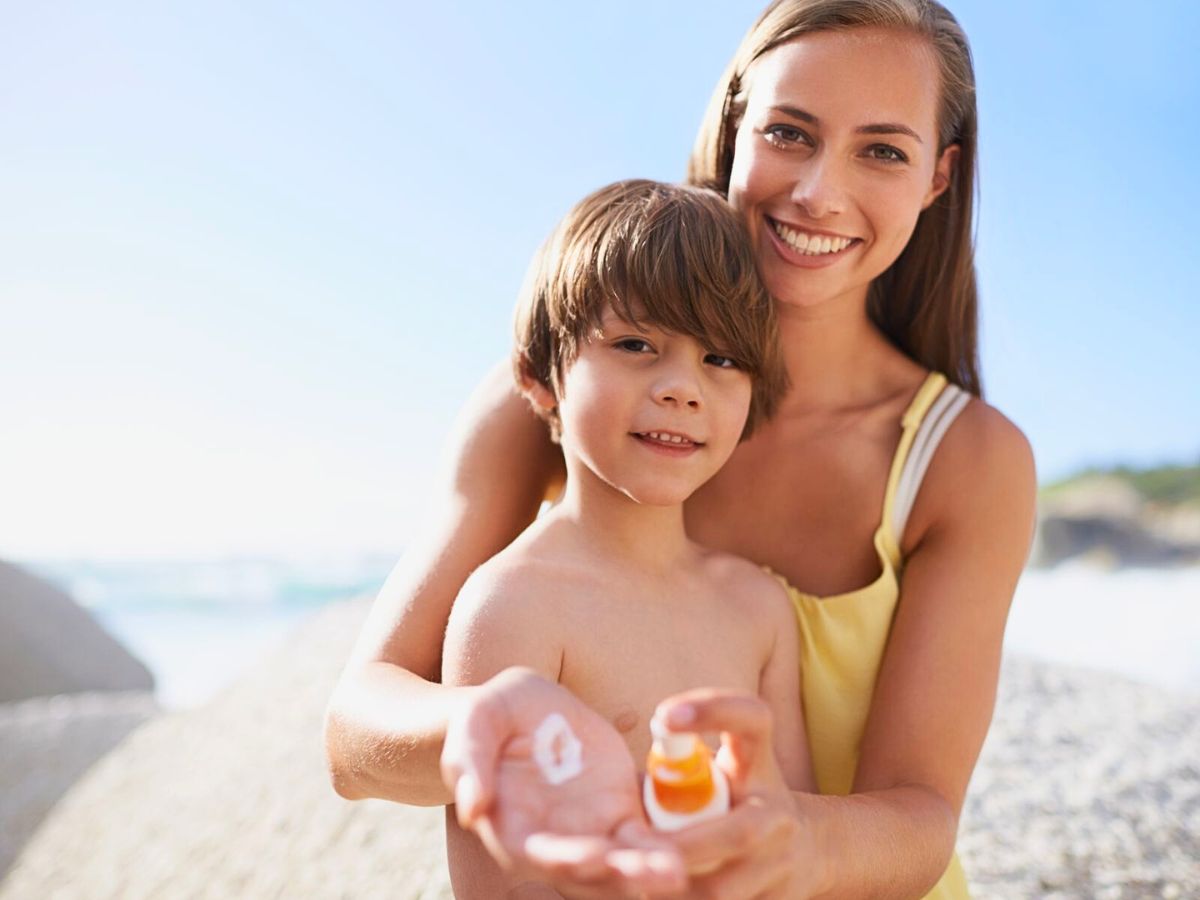
5 Reef Safe Sunscreen Brands to Try
Ready to make the switch? Here are five reef-friendly sunscreen brands that will safeguard your skin while also protecting our oceans.
1. Stream2Sea
Stream2Sea is a company committed to protecting marine ecosystems through eco-conscious skincare products. Their reef-safe sunscreens are mineral-based, non-toxic, and biodegradable, designed to protect both your skin and the environment.
I like the Stream2Sea Sport Sunscreen SPF 30. This mineral-based sunscreen is fragrance-free and non-greasy, perfect for active days. It’s super water-resistant and doesn’t sting my eyes, making it ideal for long beach days and water activities.
Sage Advice: I love that Stream2Sea also has shampoo, conditioner, bodywash, and other biodegradable products that are better for the environment.
2. ThinkSport Sunscreen
Think is dedicated to creating safe, functional, and eco-friendly products — including reef-safe sunscreens. Their sunscreens are mineral-based, free of harmful chemicals, and designed for all ages.
I like to keep a Thinksport Sunscreen Stick SPF 30 in my camera bag. The compact stick is not only easy to cart around all day, but it’s easy to apply and non-greasy.
3. Blue Lizard Reef Safe Sun Protection
I’m not surprised that Blue Lizard is a reef-safe sunscreen. After all, it’s made in Australia, where reef protection is top of mind thanks to the Great Barrier Reef. As a frequent traveler, I love Blue Lizard’s Face Mineral-Based Sunscreen. The 1.7-ounce size makes it easy for me to carry on a plane, giving me everything I need to protect my face in the palm of my hand.
4. First Aid Beauty
Last year, I received First Aid Beauty lotion in a makeup subscription box. When I realized that one of my favorite hand lotion brands also makes reef-safe sunscreen, I had to check it out.
I recently purchased the Weightless Liquid Mineral Sunscreen and love how light this Hawaii-compliant zinc oxide sunscreen is for daily use. I now use it daily under my make-up to help protect the sensitive skin on my face, whether I’m at home in Kansas City or on a tropical beach.
5. Alba Botanica
Alba Botanica is well-known for its plant-based, cruelty-free products. So when I discovered its line of reef-safe sunscreens, I had to give them a try. The Alba Botanica Sheer Mineral Sunscreen SPF 50 is a fantastic lightweight, fragrance-free option that is easy for me to tuck in my purse and bring on the plane.
Where to Buy Reef Safe Sunscreen
If you’re like me and the idea of battling crowded store aisles doesn’t appeal to you, then shopping online for reef-safe sunscreen is the way to go. Not only is it a huge time saver, but I’d rather thoroughly check the ingredient lists on my couch than standing in an aisle at the store.
Amazon is a fantastic resource for this. They offer a vast selection of reef-safe sunscreens with detailed descriptions and user reviews. Plus, many listings include the ingredients list, so you can double-check that your sunscreen is truly reef-safe before you buy.
Target and Walmart online stores also have a good range of reef-safe options, and you can often find great deals. If you’re a fan of niche, eco-friendly brands, Thrive Market specializes in sustainable products and frequently features reef-safe sunscreens with natural ingredients.
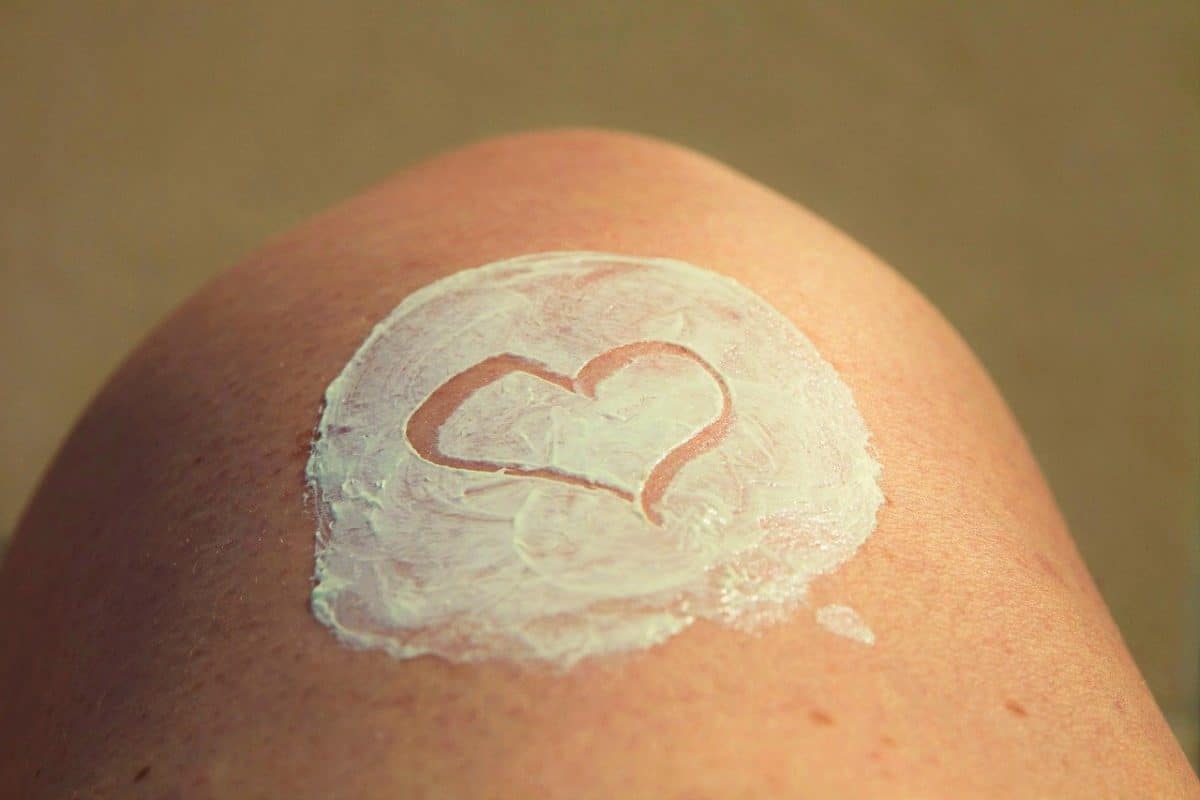
Sun-Kissed and Ocean-Friendly
Who knew that something as seemingly simple as sunscreen could have such a significant impact on our oceans? If these chemical sunscreens harm marine life, just imagine what they might be doing to our skin! That’s why I’m switching to mineral sunscreen, whether I’m laying on a beach in Hawaii or gardening in my backyard in Kansas City. With ingredients that are kinder to both my skin and the environment, it’s a win-win.
Frequently Asked Questions About Reef Safe Sunscreen
Have questions about reef safe sunscreen? I’ve got answers! Here are some frequently asked questions about mineal sunscreen.
Is mineral sunscreen reef safe?
Mineral-based sunscreens use ingredients like zinc oxide and titanium oxide instead of chemicals like oxybenzone and octinoxate to help you protect your skin. Mineral sunscreens are considered to be reef safe because the ingredients used to make them do not contribute to coral bleaching. The ingredients used in chemical sunscreens are made with ingredients that cause harm to the ocean and its reefs.
Is Neutrogena sunscreen reef safe?
Yes, Neutrogena makes reef safe sunscreen, offering products with zinc-based ingredients for sun lovers of all ages.
Is Alba Botanica sunscreen reef safe?
Yes. Alba Botanica offers mineral-based protection sunscreen products. Additionally, Alba Botanica makes spray sunscreens that are air-powered so you can apply them without worrying about harming the Earth’s ozone layer.
Is Banana Boat sunscreen reef safe?
While Banana Boat does have a line of mineral-based products, some of their sun protection products contain ingredients on the list above of chemicals to avoid including avobenzone, homosalate, octisalate, and octocrylene. So be sure to read the label and choose wisely when selecting a Banana Boat sunscreen.
Is Blue Lizard sunscreen reef safe?
Located in Australia, home of the Great Barrier Reef, Blue Lizard focuses on reef safe products.
Is Hawaiian Tropic sunscreen reef safe?
Although the beautiful tropical island of Hawaii inspires the brand’s name, many of its most widely available products include chemicals you should avoid when visiting Hawaii. They include harmful ingredients like avobenzone, homosalate, and octocrylene. Hawaiian Tropic does offer a line of mineral products that are reef safe, but you’ll want to read the label carefully when selecting a sun protection product from this brand.
Is Native sunscreen reef safe?
Native sunscreen is reef safe because it uses mineral-based ingredients. These mineral ingredients are mixed with plant-based ingredients and oils that pose no threat to coral reefs.
Do You Have a Favorite Sunscreen?
What is your favorite type of sun protection? Do you use mineral sunscreen? If so, what is your favorite brand? Share your thoughts and experiences in the comments section below.
Portions of this article originally appeared on Food Drink Life.
Ready to Go?
Use These Helpful Links to Book Your Trip!
- Find low fares with airfarewatchdog and Skyscanner
- Book your plane ticket with Expedia or Kayak
- Or take the scenic route on an epic road trip in a rental car or an RV from Outdoorsy
- From hotels to private homes, find the perfect accommodation with Hotels.com or Vrbo
- Travel in style with a suitcase, carry-on, backpack, or handbag from eBags
- Save on tickets to attractions, sightseeing tours, and more with CityPASS, Tiqets, and Viator
- Don’t leave home without travel insurance from AXA
- Discover the sights, history, and culture of your destination with an interactive scavenger hunt
- Need something else to plan your perfect trip? Visit my travel resources page for more trusted partners. Happy wandering!
Sage Scott
Thank you for sharing!

